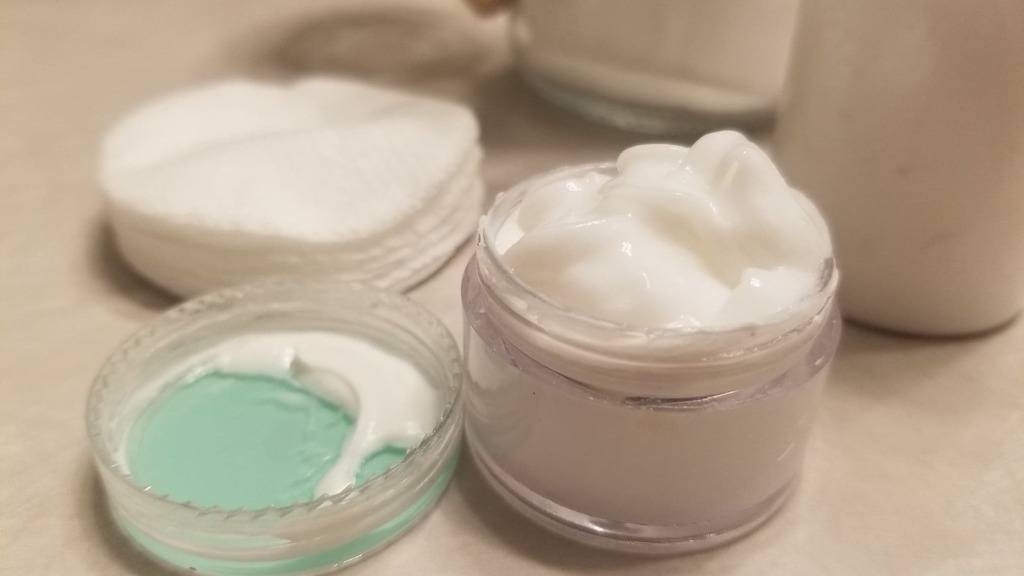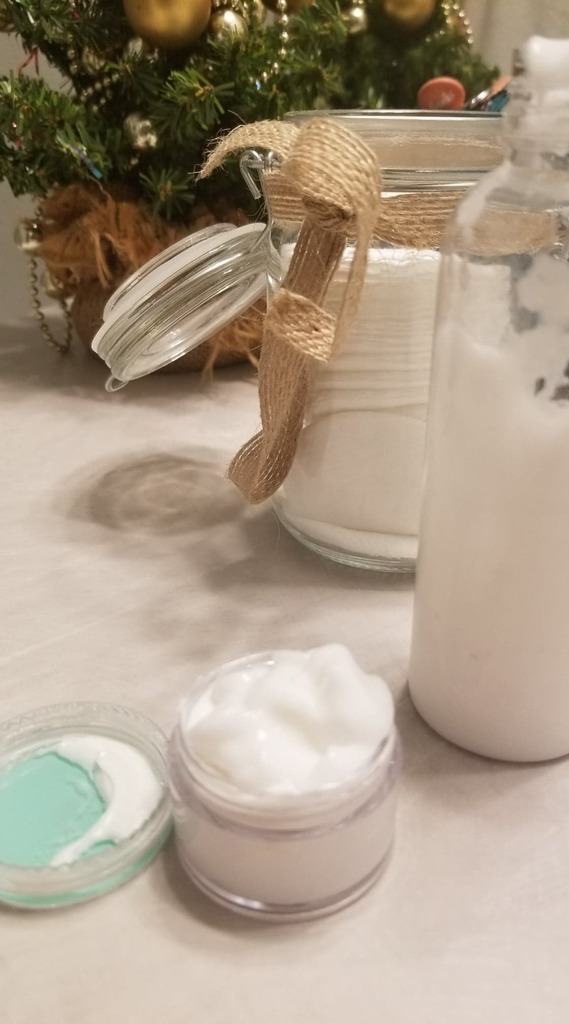Commercial face moisturizers can be packed full of harmful ingredients, but this homemade face moisturizer for acne prone skin is NOT! Made entirely out of natural ingredients, this DIY face moisturizer was made for those with oily and acne prone skin to hydrate all the while controlling oiliness and keeping breakouts at bay. This homemade face cream will not only control oil product, but also reduce it, as well as help with breakouts.

For those with acne, it can be hard to find the right products, especially when there seems to be SO many to choose from. On top of that, commercial products are often laden with chemicals, dyes, parabens, and alcohols which can dry out the skin and make acne even worse.
Homemade Face Moisturizer For Acne Prone Skin – The Ingredients
Before we begin, it’s important that you know that not all oils are bad for your skin! As someone who has suffered from acne for over 20 years, I’ve always thought that oils were a no go. We were always told that if you have oily skin, you definitely should NOT apply oils to your skin. Well, that’s actually not the case.
Turns out that there are lots of oils which are non-comedogenic (do not clog pores). See a list of carrier oils and their comedogenic rating! So when I started looking into different types of oils that would suit acne prone skin, I found that there are actually oils which can prevent acne as well as excess sebum production.
I’ve made my own homemade facial moisturizer for acne prone skin, but feel free to use your own combination of the following oils.
Sunflower Oil
Interestingly enough, sunflower oil has a comedogenic rating of 0, which is pretty amazing when you think about it! This is because sunflower oil has the highest concentration of linoleic acid, and those with oily and acne prone skin, actually have low levels of linoleic acid in their skin. It is common knowledge that oils which contain linoleic acid are very beneficial for those with acne prone skin.
One thing I will say though, is be careful about which type of sunflower oil you use. Omit from using sunflower oil that has a high level of oleic content, as it can clog pores and create breakouts. To make sure that the sunflower oil you purchase isn’t high in oleic content, just look on the bottle. Most sunflower oils will specific whether they are high in oleic content or not.
Hemp Seed Oil
Like sunflower oil, hemp seed oil also has a comedogenic rating of 0, which again, is great for those with acne prone skin. See where I’m getting at here? All of the oils in this homemade face moisturizer are BENEFICIAL to those with acne – how great is that?!
Hemp oil is great at balancing out the oils in your skin, and also helps to reduce excessive sebum production. What’s more is that hemp oil is also very gentle on the skin and can help with inflammation and cystic acne. Additionally, hemp seed oil is also said to help minimize the look of large pores, get rid of blackheads, and prevent future breakouts.
Rosehip Oil
Rosehip oil is one of those amazing all-around essential oils that EVERYONE should have in their homes. Not only does it help fight bacteria on the skin, reduces inflammation, and makes skin overall healthier, but it also combats premature aging and is said to help with hair growth.
Although rosehip oil has a comedogenic rating of 1, it’s still pretty low on the scale, and the recipe doesn’t call for much of it. At a low comedogenic rating of 1, it will not make you break out, but it will in fact prevent breakouts and help the skin re-balance itself. Oh, and did I mention it works wonderfully on fine lines and wrinkles?!
Argan Oil
Argan oil is NOT just for your hair – it’s a wonderful addition to your skin care regimen! Like sunflower oil and hemp seed oil, argan oil also has a comedogenic rating of 0, making it the perfect candidate for a homemade face moisturizer for acne prone skin.
The great thing about argan oil is that it’s really good for those with sensitive skin. So if you suffer from eczema, rosacea, or psoriasis, argan oil is gentle enough that it will not irritate the skin, but rather help with inflammation and redness. Argan oil also helps to balance the skin by regulating the production of sebum. Can be substituted for jojoba oil.
Tea Tree Oil
For those with severe acne, I highly recommend tea tree oil. While it doesn’t smell that great (at least I personally don’t think it does), tea tree oil has amazing properties which fights bacteria and prevents future breakouts.
Tea tree oil is a must to add to any homemade product, especially if you suffer from acne. It fights bacteria, and therefore prevents the formation of pimples. It also helps to balance the skin’s pH and reduce oiliness.
Shea Butter
Shea butter is used in a lot of commercial creams, and that’s because it’s an all-around great ingredient. Just like the others, it has a comedogenic rating of 0, and it’s a great moisturizer for day and night. Shea butter also has the natural ability to block the sun’s harmful UV rays, giving your homemade cream a little bit of SPF as well!
Rosewater
One of my all time favorite ingredients, rose water, is a great ingredient because it’s super gentle on the skin, smells amazing, and also helps to balance the skin. Especially for those with acne scars and dark spots, rose water is a must! See how to make your own rosewater!
Emulsifiers
Adding an emulsifier is a must when making your own beauty products. Basically, an emulsifier is an additive that helps two liquids mix well together. If you were to try and mix oil and water for example, they would just separate. But adding an emulsifier would prevent that separation, and would actually bind them together.
Montanov 68
For this recipe, there are a couple of different natural emulsifiers you can use. The first one is Montanov 68, which I usually purchase from Amazon. It’s not expensive at all, and it can be used for SO many different recipes! It will also give your moisturizer a lighty but creamy texture that goes on smooth. Montanov 68 is a tapioca and coconut oil emulsifier, and has zero additives, dyes, or fragrances.
Olive Emulsifier
Another popular emulsifier, and the one we used in this recipe, is an olive derived emulsifier, which again, you can also get on Amazon. This all natural emulsifier is derived from the olive tree and like Montanov 68, can be used for a wide range of cosmetic recipes. I like the olive emulsifier better because it gives the homemade moisturizer a nice, thick, but still light and airy consistency.
Natural Preservatives
If we want this homemade face moisturizer to last, we’ll have to add preservatives…but only natural ones of course, otherwise we’d be defeating the point of making our own face creams!
There are tons of natural preservatives, but my favorite has got to be Leucidal. Again, this can be purchased on Amazon and comes in super handy when you’re making your own lotions and potions!
Leucidal is a great preservative because it’s made from fermented radishes, and therefore it’s all natural. Plus, you only use it as 3-4% of your total recipe ingredients, which means it can stored in a cool, dry place for 3-4 months without any worries!
Essential Oils
The only essential oil I’ve added to this cream is tea tree oil, but you can totally omit that if you don’t have it, OR substitute it for another essential oil. Each person reacts differently to different ingredients, so what may work for me, may not work for you, and vice versa. I like tea tree oil because it’s powerful, yet gentle, but you can substitute it for lavender essential oil, clove essential oil, lemongrass essential oil, and the list goes on! Another note on essential oils – be sure to always use high quality brands. There are a lot of essential oil brands on the market that are not pure and/or natural, which can have adverse effects on the skin.
- Clove essential oil, for example, is great for those with cystic acne and inflamed skin as it reduces inflammation and kills bacteria.
- Lemongrass essential oil is really good at fighting breakouts and preventing future ones as well. It also smells great!
- Frankincense essential oil is great at reducing acne scars, dark spots, age spots, and other skin related issues.
Homemade Face Moisturizer For Acne Prone Skin – Recipe

Homemade Face Moisturizer For Acne Prone Skin – Recipe

The perfect face moisturizer for those with oily and acne prone skin made out of completely natural ingredients. Keeps skin soft, hydrates, and keeps breakouts at bay!
- 0.35 oz sunflower oil (NOT high in oleic acid)
- 0.18 oz argan oil
- 0.18 oz hemp seed oil
- 0.18 oz shea butter
- 0.18 oz rosehip oil
- 1.41 oz distilled water
- 0.18 oz olive emulsifier
- 0.14 oz Leucidal preservative
To a double boiler, add the distilled water along with the rosewater and gently boil while you measure out your oils.
Use a kitchen scale to weigh out each and every ingredient.
Then, heat the oils and the emulsifier in a double boiler until the emulsifier has completely melted, and all ingredient are combined.
While still hot, combine the distilled water and rosewater with the oils and emulsifier mixture. As it cools, the mixture will thicken and become more opaque.
If you see that your cream isn't emulsifying properly, that means it's a temperature problem. To fix this, simply heat again in a double boiler, stirring well.
Allow the mixture to cool completely before you go ahead and add in the preservative and any essential oils.
Pour the moisturizing cream into a clean and disinfected container of your choice.
What Causes Acne and Oily Skin?
There are literally thousands of answers to this question, as well as thousands of findings and research papers, and the bottom line is: no two skin types are the same. Some people may break out due to stress, while others have a hormonal imbalance which can cause acne. Each and every body is different, and that’s why it can be hard to pinpoint the exact cause of acne.
One thing we know for sure though, is that it CAN be controlled with a little TLC and know-how. First and foremost, it’s important to have a healthy, well balanced diet. That means getting enough fruits, veggies, and water into your body. Refined carbs and sugar can sometimes be causes of acne, as they produce sebum, which clogs pores, and therefore, breakouts.
Apart from establishing a healthy diet, it’s also important to exercise. When we exercise, toxins leave our bodies through sweat. It’s sort of like a cleansing for the body. So if at all possible, try to get at least 20 minutes of exercise into your daily routine. An overall healthy lifestyle is a great way to start to teach your body to get rid of harmful toxins and ultimately, prevent breakouts.

Awesome guide, thanks! Going to try the moisturizer recipe tonight!
I don’t have most of these ingredients 🙁 do you have a simpler homemade facial moisturizer recipe I could make??
Hi Allyssa,
Here are some DIY facial moisturizers that are much simpler and work just as well 🙂
Hello, I would like to know where you find your ingredients for this recipe. I find it difficult to find products that are natural without being tampered with. If you have a suggestion as to where I can find the ingredients you have listed I would appreciate it.